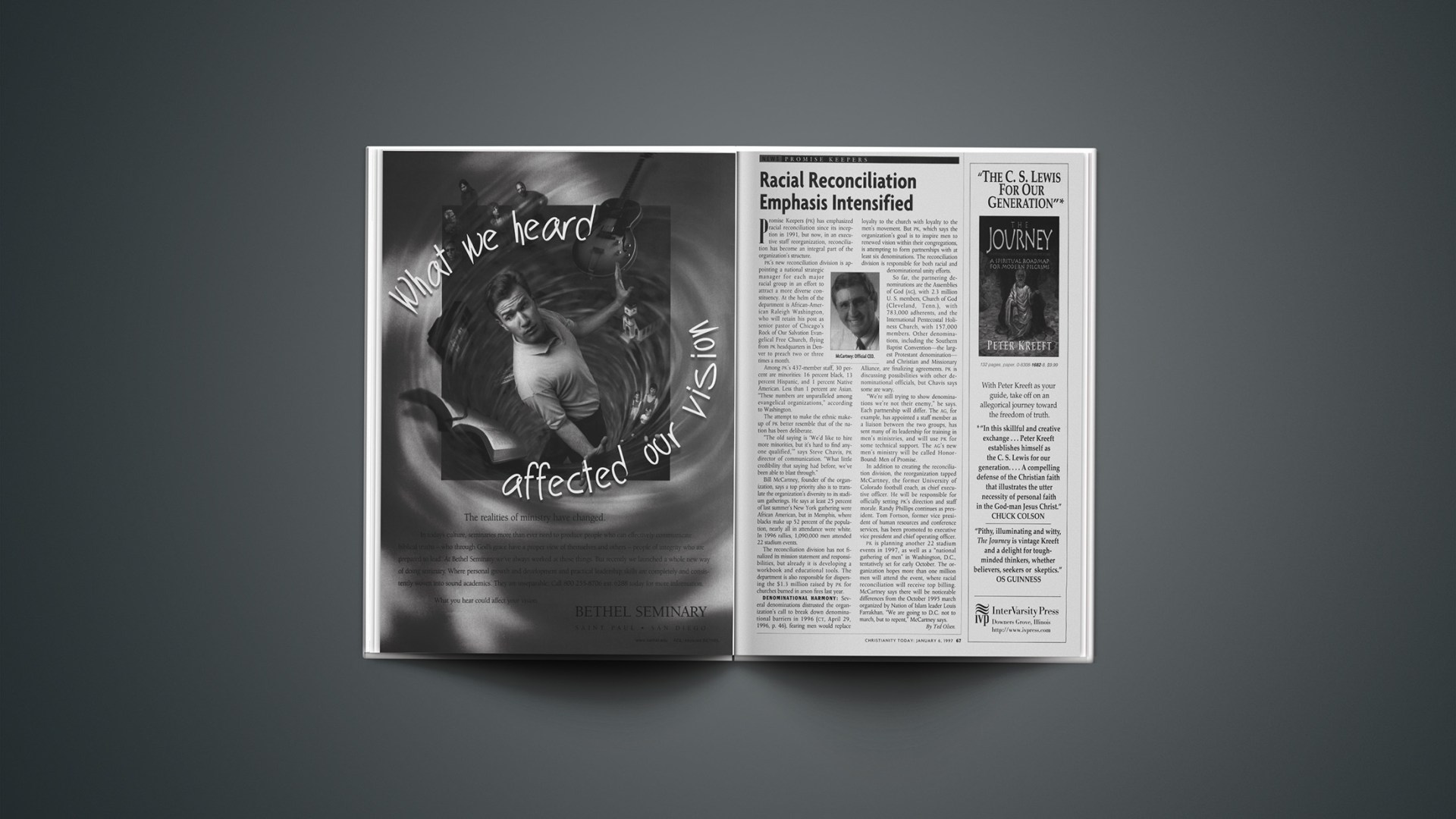Promise Keepers (PK) has emphasized racial reconciliation since its inception in 1991, but now, in an executive staff reorganization, reconciliation has become an integral part of the organization’s structure.
PK’s new reconciliation division is appointing a national strategic manager for each major racial group in an effort to attract a more diverse constituency. At the helm of the department is African-American Raleigh Washington, who will retain his post as senior pastor of Chicago’s Rock of Our Salvation Evangelical Free Church, flying from pk headquarters in Denver to preach two or three times a month.
Among PK’s 437-member staff, 30 percent are minorities: 16 percent black, 13 percent Hispanic, and 1 percent Native American. Less than 1 percent are Asian. “These numbers are unparalleled among evangelical organizations,” according to Washington.
The attempt to make the ethnic makeup of PK better resemble that of the nation has been deliberate.
“The old saying is ‘We’d like to hire more minorities, but it’s hard to find anyone qualified,'” says Steve Chavis, pk director of communication. “What little credibility that saying had before, we’ve been able to blast through.”
Bill McCartney, founder of the organization, says a top priority also is to translate the organization’s diversity to its stadium gatherings. He says at least 25 percent of last summer’s New York gathering were African American, but in Memphis, where blacks make up 52 percent of the population, nearly all in attendance were white. In 1996 rallies, 1,090,000 men attended 22 stadium events.
The reconciliation division has not finalized its mission statement and responsibilities, but already it is developing a workbook and educational tools. The department is also responsible for dispersing the $1.3 million raised by PK for churches burned in arson fires last year.
DENOMINATIONAL HARMONY: Several denominations distrusted the organization’s call to break down denominational barriers in 1996 (CT, April 29, 1996, p. 46), fearing men would replace loyalty to the church with loyalty to the men’s movement. But PK, which says the organization’s goal is to inspire men to renewed vision within their congregations, is attempting to form partnerships with at least six denominations. The reconciliation division is responsible for both racial and denominational unity efforts.
So far, the partnering denominations are the Assemblies of God (AG), with 2.3 million U. S. members, Church of God (Cleveland, Tenn.), with 783,000 adherents, and the International Pentecostal Holiness Church, with 157,000 members. Other denominations, including the Southern Baptist Convention—the largest Protestant denomination—and Christian and Missionary Alliance, are finalizing agreements. pk is discussing possibilities with other denominational officials, but Chavis says some are wary.
“We’re still trying to show denominations we’re not their enemy,” he says. Each partnership will differ. The AG, for example, has appointed a staff member as a liaison between the two groups, has sent many of its leadership for training in men’s ministries, and will use pk for some technical support. The AG’s new men’s ministry will be called HonorBound: Men of Promise.
In addition to creating the reconciliation division, the reorganization tapped McCartney, the former University of Colorado football coach, as chief executive officer. He will be responsible for officially setting PK’s direction and staff morale. Randy Phillips continues as president. Tom Fortson, former vice president of human resources and conference services, has been promoted to executive vice president and chief operating officer.
PK is planning another 22 stadium events in 1997, as well as a “national gathering of men” in Washington, D.C., tentatively set for early October. The organization hopes more than one million men will attend the event, where racial reconciliation will receive top billing. McCartney says there will be noticeable differences from the October 1995 march organized by Nation of Islam leader Louis Farrakhan. “We are going to D.C. not to march, but to repent,” McCartney says.
Copyright © 1997 Christianity Today. Click for reprint information.










